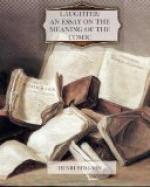almost transparent, for the artist and the poet.
What fairy wove that veil? Was it done in malice
or in friendliness? We had to live, and life demands
that we grasp things in their relations to our own
needs. Life is action. Life implies the
acceptance only of the
utilitarian side of things
in order to respond to them by appropriate reactions:
all other impressions must be dimmed or else reach
us vague and blurred. I look and I think I see,
I listen and I think I hear, I examine myself and
I think I am reading the very depths of my heart.
But what I see and hear of the outer world is purely
and simply a selection made by my senses to serve
as a light to my conduct; what I know of myself is
what comes to the surface, what participates in my
actions. My senses and my consciousness, therefore,
give me no more than a practical simplification of
reality. In the vision they furnish me of myself
and of things, the differences that are useless to
man are obliterated, the resemblances that are useful
to him are emphasised; ways are traced out for me
in advance, along which my activity is to travel.
These ways are the ways which all mankind has trod
before me. Things have been classified with a
view to the use I can derive from them. And it
is this classification I perceive, far more clearly
than the colour and the shape of things. Doubtless
man is vastly superior to the lower animals in this
respect. It is not very likely that the eye of
a wolf makes any distinction between a kid and a lamb;
both appear t o the wolf as the same identical quarry,
alike easy to pounce upon, alike good to devour.
We, for our part, make a distinction between a goat
and a sheep; but can we tell one goat from another,
one sheep from another? The
individuality
of things or of beings escapes us, unless it is materially
to our advantage to perceive it. Even when we
do take note of it—as when we distinguish
one man from another—it is not the individuality
itself that the eye grasps,
i.e., an entirely
original harmony of forms and colours, but only one
or two features that will make practical recognition
easier.
In short, we do not see the actual things themselves;
in most cases we confine ourselves to reading the
labels affixed to them. This tendency, the result
of need, has become even more pronounced under the
influence of speech; for words—with the
exception of proper nouns—all denote genera.
The word, which only takes note of the most ordinary
function and commonplace aspect of the thing, intervenes
between it and ourselves, and would conceal its form
from our eyes, were that form not already masked beneath
the necessities that brought the word into existence.
Not only external objects, but even our own mental
states, are screened from us in their inmost, their
personal aspect, in the original life they possess.
When we feel love or hatred, when we are gay or sad,
is it really the feeling itself that reaches our consciousness




